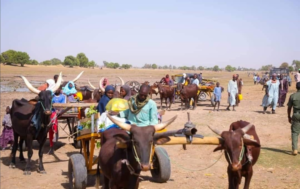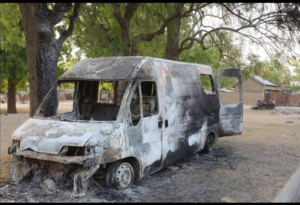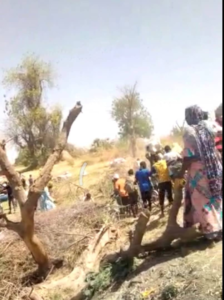Damasak: When Going Home Becomes Unsafe For Returnee-IDPs
The government of Borno, Northeast Nigeria, started an IDP resettlement programme in 2020; Damasak is one the target communities. However, a few months after hundreds of households relocated to Damasak, the border community is once again unsafe.

This week, two disconcerting videos trended on social media — one from a faction of the armed insurgent group, Islamic State West Africa Province (ISWAP), and the other from fleeing residents of Damasak, a town in Northeast Nigeria.
The videos depicted an attack on Damasak, the United Nations (UN) humanitarian hub, NGO facilities, and its impact on residents of the border community.
ISWAP fighters staged a daring attack on the town between Sunday, April 11, and Monday, April 12, during which a UN hub and three facilities of international NGOs were torched. The attackers also set ablaze a police station and some private properties before carting away food supplies and vehicles.
The assailants left at least six persons, including some special forces soldiers, dead on the first day.
UN Resident and Humanitarian Coordinator in Nigeria, Edward Kallon, confirmed the attack while condemning the continuous assault on aid workers and critical logistical facilities of the international body.
“Humanitarian aid operators and facilities are the lifelines for people affected by violence and conflict in northeast Nigeria who are dependent on assistance to survive,” Kallon said.
Due to the attack on the UN and other aid workers, “humanitarian operations will be reduced due to the violent attack, which will affect the support to 8,800 internally displaced persons and 76,000 people in the host communities,” he added.
Damasak, the Mobbar Local Government Area (LGA) headquarters, is not a resettled community but a mega displacement camp that now houses people of the LGA who were recently returned from the Niger Republic IDP camps in Maiduguri after many years of displacement.
In January, Borno state governor, Babagana Zulum, led officials and thousands of IDPs to Damasak in line with his government’s determination to return all IDPs to their reclaimed communities by May 2021. The governor made headlines for personally re-enrolling 1,600 children during his January visit.

More attacks
On Tuesday, barely 24 hours after the attack on Damasak, ISWAP released a 59 seconds video that captured the invasion. It showed, embarrassingly, the ease with which the well-fortified border community was attacked.
Some of the residents who spoke to HumAngle expressed concerns that the insurgents faced little to no resistance from the security forces before taking charge of the town for hours. They freely went about, torching buildings.
A family member of one attacked resident in Damasak informed this reporter that when an Air Force jet later came to fight the insurgents, “its first shot missed the target and landed on a compound where the family had gathered for a naming ceremony.”

“The missed target bomb killed the new baby, its mother, the father and six other persons, mostly women,” he said.
The insurgent also slaughtered two unidentified civilians, and two soldiers paid the supreme price during the incident. Many of the residents took to the bush for fear of their lives.
As Nigerians continued to express shock over the attack on Damasak, the state governor on Wednesday stormed the Nigeria Defense and Army headquarters to complain over the attack.
Governor Zulum was accompanied by three Borno Senators, including his predecessor Kashim Shettima, Senator Abubakar Kyari, who is from Damasak, and Senator Ali Ndume, who chairs the Senate Committee on the Army.
Though the delegation’s meetings with the Service Chiefs were held behind closed doors, Governor Zulum had at the beginning of one of the meetings lamented on the lack of synergy and trust among the soldiers, the people, and the government.
He added that the three stakeholders must work together because “one thing we must do is to ensure ongoing operations are sustained and farmers can return to their farmlands so that we reduce reliance on food aid that is not sustainable.”
Two days after the governor met the military chiefs who promised to resolve the impasse in Damasak within “the shortest possible time,” the insurgents returned to carry out another attack on civilians.
The second attack, which coincided with the start of the Muslim month of fasting, was seen as a major setback on the confidence-building for the returned IDPs.

Casualties
According to figures released by the Borno state government, at least 18 persons lost their lives in the two attacks.
Governor Zulum had on Thursday visited Damasak town to sympathise with the people. A heavily armed escort that included soldiers, police officers, and other paramilitary security outfits led the way from Maiduguri to Damasak.
In Damasak, few residents, who had returned to their homes days after fleeing, narrated their ordeals to the governor, most fearing that the attackers could come back. Many who had fled into border communities of Chad were still away when the governor visited.
“We had to run for our dear lives when they attacked Damasak on Sunday evening,” one of the IDPs who made it to Maiduguri told HumAngle.
“They continued shooting and burning buildings and NGO up to Monday morning. We were told we would be safer here when the government asked us to return to our homes in Damasak. But on that day, even the soldiers were helpless; they were not on sight till when the Air Force plane came to throw bombs,” he continued.
“I had to tell my family that we must leave at once because we heard on the grapevine that they would still come back again.”
One attack too many
This is not the first time the terror group would be attacking ‘resettled’ communities. On March 1, Dikwa, a town 85km east of Maiduguri, came under heavy attack as armed insurgents dislodged soldiers and took control of the community from the evening of that day to the next morning when they left on their own.
In Dikwa, the attackers targeted a UN hub and some humanitarian offices using explosives. They burnt several UN and humanitarian vehicles before rounding up the villagers and dispossessing them of their valuables.
Dikwa has over 100,000 IDPs spread across a displacement camp and the host community.
The attack on the town came three days after the state governor visited and shared N115 million in cash, along with food items for the IDPs. Sources said the insurgents may have targeted the money and food distributed.
UN’s Humanitarian Coordinator in Nigeria, Edward Kallon, had expressed outrage over the Dikwa attack, confirming that “the premises of several aid agencies and a hospital were reportedly set ablaze or sustained damage.”
On February 25, an armed group believed to be of the ISWAP faction raided Marte and sent everyone, including soldiers, fleeing, after dislodging a military super camp of the 22 Brigade. The insurgents took control of Marte, hoisted their flags for about 24 hours until the military mobilised to retake the border community.
Residents of Marte, a town seized by Boko Haram in 2014, were returned to their community for the first time in December last year when the government moved a total of 2,870 IDPs from Maiduguri camps.
Some of the IDPs who fled Marte because of the February attack have not returned to the community to date.
Closing the IDP camps
Governor Zulum has spent many of his days, since he assumed office nearly two years ago, in the hinterlands of Borno, where he is either supervising reconstruction works or sharing cash and food palliative to IDPs in garrison communities.
The governor said last year that he intended to close all the IDP camps by the end of May 2021, a target he kept reinforcing in his public speeches and engagements.
He had in Nov. 2020, during one of his visits to the presidential villa, spoken extensively about his plans of returning IDPs to their communities as one of his strategies for ending the Boko Haram war.
He believes and insists that IDPs relying on food relief is not a sustainable enterprise.
“We want to ensure that our people return to their communities, have access to their farmlands, to their livestock farms, and aquaculture farms,” he said while fielding questions from Villa correspondents. “This is the only solution; because military solutions alone will never solve the problem.”
He said ensuring adequate security in the localities was one of the conditions for returning displaced people, and that his government was receiving support from the military and various federal government agencies.
“The gradual return of people to their respective localities is a symbol of peace. So far so good, we are doing well; we need continuous support from the Nigerian military. We need sustainable support to ensure that this madness is brought to an end,” he said.
It is now about six weeks to the end of the deadline set for closing the IDP camps. The Nigerian government and its military are still struggling to end the war that has entered into its second decade. While the military continues to take the war to the enclaves of the terrorists, the enemy forces are still targeting citizens in relocated communities, forcing the people to suffer further displacements as well as the trauma of running for their lives repeatedly.
Civil society calls for change of strategy
Executive Director of the Network of Civil Society Organisations (NECSO) in Borno State, Ambassador Ahmed Shehu, has called for a different approach towards ending the Boko Haram conflict.
“It is eleven years now with no sign of an end to the conflict,” Shehu said in a statement obtained by HumAngle. “If the kinetic warfare that we are exploring, from all indications, cannot solve the problem, let us explore a political solution towards ending the conflict.”
While urging the federal government and military to improve on civilian-military relationship, the civil society activist pleaded with the Federal Government “to enhance its leadership and responsibility of protecting the life and properties of the citizens.”
Shehu observed that constant attacks on civilians returning to their “liberated” communities after many years “is even a breach of basic protocol of safety as a precondition for returning people in displacement.”
He called on the federal and state governments to make “constant civic authority and presence in local government areas [as] this will go a long way towards giving the citizens the confidence to return and pick up their livelihoods.”
There are about 32 recognised IDP camps in Borno State, with 16 of them within Maiduguri metropolis alone, where over one million of the about 2.5 million displaced people in the Northeast are currently dwelling.
This investigative report is a partnership between the African Transitional Justice Legacy Fund (ATJLF) and HumAngle Media under the ‘Mediating Transitional Justice Efforts in North-East’ project.
Support Our Journalism
There are millions of ordinary people affected by conflict in Africa whose stories are missing in the mainstream media. HumAngle is determined to tell those challenging and under-reported stories, hoping that the people impacted by these conflicts will find the safety and security they deserve.
To ensure that we continue to provide public service coverage, we have a small favour to ask you. We want you to be part of our journalistic endeavour by contributing a token to us.
Your donation will further promote a robust, free, and independent media.
Donate HereStay Closer To The Stories That Matter




